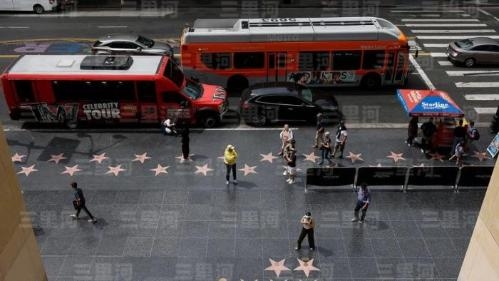EconoScope | U.S. faces triple economic chill as tariff strategy falters
(ECNS) -- "Instead of taxing our citizens to enrich other countries, we will tariff and tax foreign countries to enrich our citizens." So said U.S. President Donald Trump in his inaugural address this January. But six months later, signs suggest the high-tariff approach is losing steam, as the American economy weathers a triple wave of slowdown.

From the beginning of 2025 to early summer, the U.S. government has been trying to deliver on its campaign promise. However, things have not gone as planned, with the American economy likely to face a significant chill.
First chill: U.S. tourism takes a hit
According to data released by Tourism Economics, a subsidiary of UK Oxford Economics, due to the U.S. government's reciprocal tariffs and other policies, the number of international inbound travelers to the U.S. is projected to drop by 8.7% in 2025. International visitors are expected to spend $8.5 billion less in the U.S. this year than last year.
The latest report from tourism analysts shows that this will be the worst summer slump for the American tourism industry since 2013.
Tourism is not just about ticket sales — dining, transportation, accommodation, and even the manufacturing behind souvenirs and related products are all closely tied to it. Fortune magazine warns that the decline in foreign tourists could put many jobs and significant tax revenue at risk.
The U.S. government's border control measures and tariff policies have long sparked dissatisfaction among many trading partners, severely damaging America's international image. As a result, foreign tourists are removing the U.S. from their overseas travel plans, using their travel choices to "retaliate" against tariffs. International students and new immigrants can no longer be counted on to make up the shortfall.
June has been far from peaceful in the U.S. In the east, on June 4, President Trump signed a proclamation restricting visas for international students at Harvard University, suspending the entry of foreign nationals who plan to study or participate in exchange programs there. In the west, Los Angeles has been rocked by ongoing violent clashes sparked by large-scale federal raids targeting undocumented immigrants.
Although restrictions on studying abroad have been temporarily eased, the U.S. government's series of moves has already shaken the confidence of international students and immigrants. Whether to go to the U.S. will be a decision taken with increasing caution in the future.
Second chill: U.S. domestic consumption feels the squeeze
Last Thursday, the U.S. Department of Commerce announced that ordinary household appliances made with steel components, including refrigerators and washing machines, would soon be subject to new tariffs.
Summer is usually the peak season for consumers to use refrigerators, air conditioners, and other appliances to beat the heat. Imposing tariffs currently makes it harder for households to stay cool, leaving American consumers facing higher costs and cooler spending.
A recent consumer survey by KPMG shows that, due to the impact of tariffs, 50% of American consumers are cutting back on purchases, and 49% are actively looking for deals and discounts. Many Americans say that while they still plan to travel this summer, they have already reduced their personal spending in other areas.
Third chill: Consumer confidence crumbles
Since January, the University of Michigan's Consumer Sentiment Index has dropped by nearly 30% and, as of May, remains at its lowest point since 2022. This data shows that the Trump administration's tariff policies have fueled growing fears of an economic recession.
One of the main arguments for the government's aggressive tariffs is to bring manufacturing back to America. However, so far, the grand promises made by the U.S. government about bringing manufacturing back and creating jobs have yet to materialize.
Bloomberg journalist Max Chafkin remarked that there are still plenty of manufacturers in the U.S., but these manufacturers don't employ a lot of people. In reality, U.S. manufacturing is increasingly unable to create new job opportunities for Americans.
Difficulties in finding jobs and soaring prices, combined with eroding confidence in an uncertain economic outlook, further suppress consumer spending and business investment, driving unemployment even higher in a vicious cycle.
The U.S. government's rampant trade protectionism only highlights the shortsightedness of American policymakers. In the 19th century, trade protection was indeed a winning formula for the rise of American manufacturing. But times have changed: today's global economic landscape and market dynamics are vastly different.
High tariffs have become an expired remedy for the U.S. economy. Rather than reversing the trend of industrial hollowing-out, they risk straining ties with key allies and dealing fresh blows to foreign trade and tourism under mounting retaliatory pressure. At home, tariffs erode consumer purchasing power, further dampen confidence, and deepen the risk of a more severe recession.
If the U.S. hopes to revive its summer economy, scrapping high tariffs should be the first step. Otherwise, once public confidence turns cold, no policy may be strong enough to warm it again.
(By Gong Weiwei)

